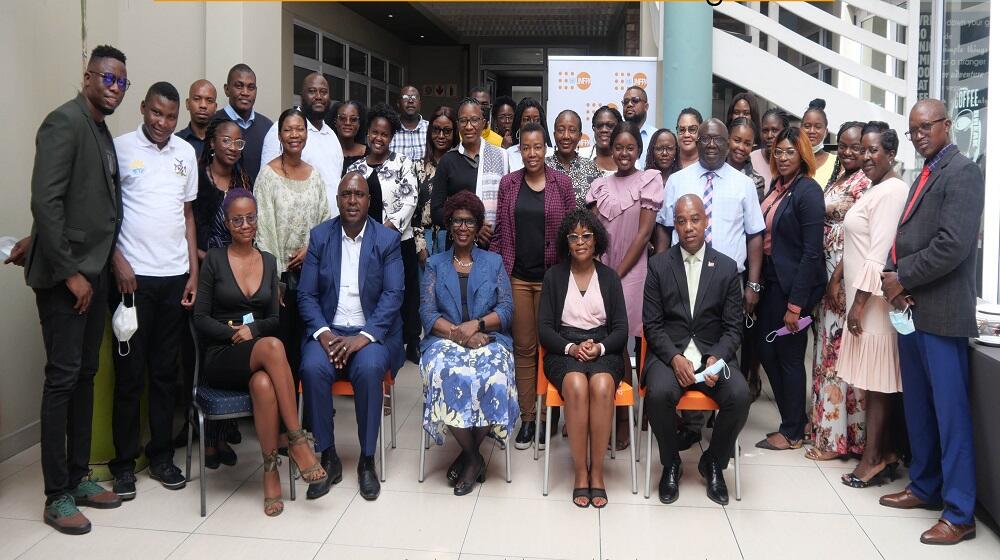SWAKOPMUND – The United Nations Population Fund (UNFPA) Namibia Country Office and the National Planning Commission (NPC) have successfully completed the joint Annual Review for the third year of the UNFPA/Government Sixth Country Programme (2019-2023).
The 6th Country Programme is the framework under which UNFPA supports the Government of the Republic of Namibia.
Organized under the leadership of NPC, the meeting took place from 16 -18 February 2022 in Swakopmund and was attended by over 47 participants from Government ministries, Implementing Partners (IPs), Civil Society Organizations (CSOs), United Nations Development Programme (UNDP) and UN Resident Coordinator Office, including NPC Deputy Chief National Development Advisor, Mr. Ned Sibeya.
The partners reviewed the progress of the implementation of the third-year roll-out of the Country Programme. The review also included discussions on the performance of both UNFPA and IPs, lessons learned, and revision of proposed strategic interventions for 2022.
The Country Programme focuses on two outcomes of the UNFPA global Strategic Plan 2018-2021; Adolescents and Youth and Gender Equality and Women’s Empowerment. In this regard, the Country Programme seeks to contribute to national efforts to harness the demographic dividend through investments in sexual and reproductive health, the elimination of gender-based violence and harmful practices that hinder the potential of youth and adolescents.
This year is particularly critical because of the new global UNFPA Strategic Plan 2022-2025 and the evaluation and alignment of the current Country Programme to the new Strategic Plan. Despite the challenges and complexities of the COVID-19 pandemic, the government, UNFPA, other UN sister agencies, implementing partner and development partners, managed to deliver lifesaving assistance to the most vulnerable women, adolescents, and youth in the hardest to reach areas to ensure that no one is left behind. During the meeting, all stakeholders had the opportunity to provide input into the Country Programme and highlight possible areas of collaboration. There was robust discussion on pertinent points and all participants shared experiences and gave inputs on how to overcome challenges.
Among the more pronounced achievements in the areas of adolescent and youth-friendly health services – To ensure continuity of the essential sexual and reproductive health (SRH) services during the pandemic, static and mobile outreaches were conducted, reaching 21 347 young people across nine (9) regions of the country, while a total of 5 132 youth were reached through ‘The Condomise’ campaigns.
UNFPA donated reproductive health commodities to the Ministry of Health and Social Services (MoHSS). This included 720,000 pieces of male condoms, 5,000 Jadelle implantable contraceptives, and four (4) laptop computers. As a result, a total of 81 health care workers from Oshikoto and Omusati were trained on family planning and 607 implants were inserted into women and girls during the practicals.
Young people's knowledge and skills – In 2021, the National Youth Policy III was launched and translated into braille to ensure accessibility for all including youth with disabilities. The policy seeks to address challenges that undermine youth development in the country to ensure that young Namibians can assume their rightful place in building a “united, inclusive and prosperous Namibian House”. The comprehensive sexuality education (CSE) module that integrates climate change was successfully piloted and the Menstrual Health Study completed. Through the #BeFree programme, seven dialogues on HIV, gender-based violence, menstrual awareness, positive life skills, substance abuse, SRH, masculinity and gender equality were conducted reaching 2 000 young people.
Gender-based violence – About 103 adolescents and young people were trained as facilitators to create awareness and mobilize peers to promote sexual and reproductive health and rights, and prevent sexual gender-based violence (SGBV) in Khomas, Erongo, Omusati and Oshana regions. Additionally, 112 men were face-to-face engaged through male engagement sessions from targeted communities in the Erongo, Omusati, and Khomas regions. About 70% of the Namibian population were reached with messages on the importance of engaging men and boys for the promotion of SRH and prevention of GBV through episodes aired by the Namibia Broadcasting Corporation Television. Through the #BreakFree programme eight capacity building on SGBV and trauma debrief sessions were held for social workers, police officers, church leaders, teachers, health care professionals, student leaders and private sector companies.
Data – Several studies were conducted in 2021, which include among others, the COVID-19 Households and Job Tracker Impact Survey, the analysis of the 2018 – 2020 vital and causes of deaths statistics from the Ministry of Home Affairs, Immigration and Safety and Security, and the production of the Namibia Multi-dimensional Poverty Index report.
While acknowledging the positive milestones taken in 2021, participants at the meeting agreed on the need for more innovative and integrated approaches to reach more women, adolescents and young people than ever before, especially those furthest behind.
“Let us not shy away from away from introducing new ideas and approaches that will best advance the needs and achieve our desired results,” urged Sheila Roseau, UNFPA Namibia Representative.
“We need to make the invisible visible and leave no one behind especially those that are furthest such as women, adolescents and young people that are GBV survivors/victims, migrants, with disabilities, pregnant, out of school, unemployed, in poverty, living in remote areas,” she stated.
NPC’s Deputy Chief National Development Advisor, Mr. Ned Sibeya added that monitoring and evaluation should be a continuous exercise in order to take stock of implementation and trace challenges at an early stage. “This will help to take corrective measures and get the programmes back on track,” he stressed.


